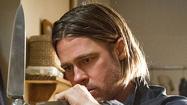That unstoppably manic movement is the most unexpected part of "World War Z" as well as its most memorable. But while the rest of the film, directed by Marc Foster and featuring the irreplaceable charisma of Brad Pitt, is zombie business as usual, it's fun to see this kind of familiar material done with intelligence and skill.
Based loosely on the book by Max Brooks, "World War Z" is in some ways less a zombie movie than the story of a global pandemic and the heroic individual (guess who) trying to stop it. Think "Contagion" with zombies only marginally less emotional than Steven Soderbergh's icy characters.
The presence of four credited writers (screenplay by Matthew Michael Carnahan and Drew Goddard & Damon Lindeloffrom a story by Carnahan and J. Michael Straczynski) is testament to the tangled (and much written about) production history of a film originally set to be released last year.
"World War Z" plays a bit like a series of separate films and the juncture where the new final act was grafted onto the proceedings is unmistakable, but unless you knew about the film's troubled past, you'd never guess it existed. Against considerable odds, the ability and professionalism of the cast and crew have carried the day.
It doesn't hurt, obviously, to have a director whose eclectic resume ("Monster's Ball," "The Kite Runner," "Quantum of Solace") bespeaks a questioning sensibility, as well as a star like Pitt, an involved producer whose Plan B production company bought the rights to the book in the first place.
The film opens with the obligatory but mercifully brief happy family scenes where Pitt's character, Gerry Lane, is established as a stay-at-home Philadelphia dad who doesn't seem to do anything more strenuous than make pancakes for breakfast.
Then, with out-of-nowhere suddenness, as Gerry is stuck in traffic with wife Karen (a worried-looking Mireille Enos of"The Killing") and their two kids, the world as we know it comes to an end in the most unnerving, terrifying way. Infected, twitchy zombies frantically search out the living, even using their foreheads to beat against car windows, all with the aim of biting their victims into the same unsavory state.
Splendidly orchestrated by second-unit director and stunt coordinator Simon Crane (who had a hand in the "Saving Private Ryan" battle scenes) and effectively edited by Roger Barton and Mark Chesse, these scenes of panic, pandemonium and societal collapse are effective and remarkably plausible.
The attacks have barely begun before Gerry gets a call from U.N. Deputy Secretary-General Thiery Umutoni ("Hotel Rwanda's" Fana Mokoena). It turns out that in his pre-pancake days, Gerry was the international body's top field investigator, a specialist in crisis situations, and if this globe-sweeping epidemic isn't a crisis, nothing is.
Gerry is loathe to come out of retirement (the guy really likes his pancakes) but with the help of a daring helicopter rescue he and his family are deposited on an aircraft carrier, perhaps the planet's only safe zone, and Gerry is essentially blackmailed into accompanying a young scientist to South Korea, where it's thought the zombie-making began.
"Mother Nature is a serial killer, she wants to get caught, she leaves bread crumbs, she leaves clues," the scientist memorably says. What seems like the epidemic's strengths can mask a weakness.
It's in Israel, where the plot takes Gerry next, that "World War Z's" visual centerpiece erupts. Roused from a dormant state by noise, or so the film posits, the zombies form an angry hoard that so swarms one on top of the other that they form a pyramid that allows them to surmount a protecting wall. Long shots of this CGI happening, some taken from a helicopter, will not soon be forgotten.
What transpires after this gets a bit formulaic, but it's good to have Pitt in the one-man-against-the-apocalypse role. Though nothing about this part is a particular challenge, it's satisfying to see the actor handling being an old-school Mr. Intrepid without breaking a sweat. In a world where we all feel more threatened than we ever have by myriad forces beyond our control, from global warming to spying governments, it is comforting perhaps to see the personification of these fears in creatures that also cannot be stopped. Unless Brad Pitt gets in the way.
At one point, if press reports are to be believed, "World War Z" was supposed to have a sociopolitical subtext. That is largely gone, but what remains is a film smartly enough made to help us understand why so many are so fixated on the undead.
kenneth.turan@latimes.com
.gif)




.jpg)


